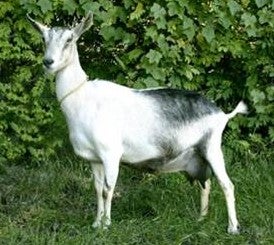
Artemis– founder animal of the UC Davis lysozyme line of transgenic goats
Diarrheal diseases in infancy and childhood are responsible for substantial morbidity and mortality in developing nations and remain the second leading cause of death of children under the age of five worldwide. One approach to this common problem is to extend the benefits of human milk to children beyond the age of breastfeeding by genetically engineering dairy animals to contain increased levels of human milk protective antimicrobial proteins. More specifically, we have generated transgenic goats that express increased levels of human lysozyme, a key human milk component thought to be involved with the development of a health-promoting gut microbiota. The overarching hypothesis is that upon consumption, lysozyme-rich milk from transgenic goats will cause a beneficial modulation of intestinal microbiota populations thereby resulting in improved intestinal, immune and overall health. To test this hypothesis, we use a more human-relevant animal model, the pig, in conjunction with molecular techniques to determine how milk in general and the lysozyme-rich milk can influence the state of the intestine and clinical responses to E. coli infection and malnutrition. We take a systems biology approach by collecting data on the physical state of the animals, intestinal morphology, microbiota, transcriptome and metabolome with the goal of integrating these multi-omic datasets to explain the animal phenotypes as a result of milk consumption. The work conducted along this line is both mechanistic and translational in nature by not only dissecting out the role gut microbiota modulation plays on health, but also by translating the use of lysozyme-rich milk into an effective preventative or treatment agent against diarrheal illnesses.